TOYOTA iA 2016 (in English) Service Manual
Manufacturer: TOYOTA, Model Year: 2016, Model line: iA, Model: TOYOTA iA 2016Pages: 588, PDF Size: 5.15 MB
Page 41 of 588
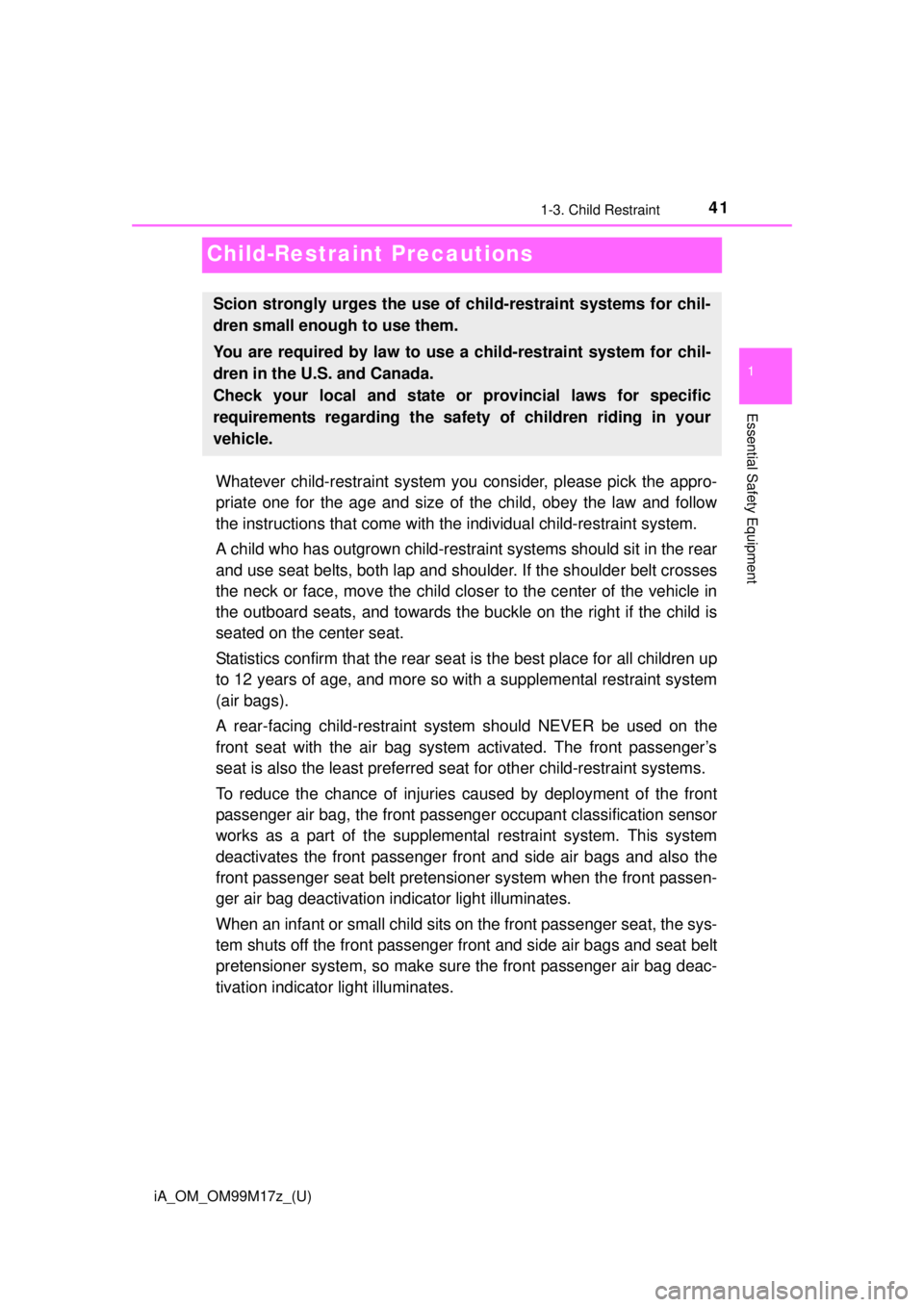
41
iA_OM_OM99M17z_(U)
1-3. Child Restraint
1
Essential Safety Equipment
Child-Restraint Precautions
Whatever child-restraint system you consider, please pick the appro-
priate one for the age and size of the child, obey the law and follow
the instructions that come with the individual child-restraint system.
A child who has outgrown child-restrain t systems should sit in the rear
and use seat belts, both lap and sh oulder. If the shoulder belt crosses
the neck or face, move the child clos er to the center of the vehicle in
the outboard seats, and towards the buckle on the right if the child is
seated on the center seat.
Statistics confirm that the rear seat is the best place for all children up
to 12 years of age, and more so with a supplemental restraint system
(air bags).
A rear-facing child-restraint sy stem should NEVER be used on the
front seat with the air bag system activated. The front passenger’s
seat is also the least preferred seat for other child-restraint systems.
To reduce the chance of injuries caused by deployment of the front
passenger air bag, the front passeng er occupant classification sensor
works as a part of the supplemen tal restraint system. This system
deactivates the front passenger front and side air bags and also the
front passenger seat belt pretensioner system when the front passen-
ger air bag deactivation indicator light illuminates.
When an infant or small child sits on the front passenger seat, the sys-
tem shuts off the front passenger front and side air bags and seat belt
pretensioner system, so make sure the front passenger air bag deac-
tivation indicator light illuminates.
Scion strongly urges the use of child-restraint systems for chil-
dren small enough to use them.
You are required by law to use a child-restraint system for chil-
dren in the U.S. and Canada.
Check your local and state or provincial laws for specific
requirements regarding the safety of children riding in your
vehicle.
Page 42 of 588
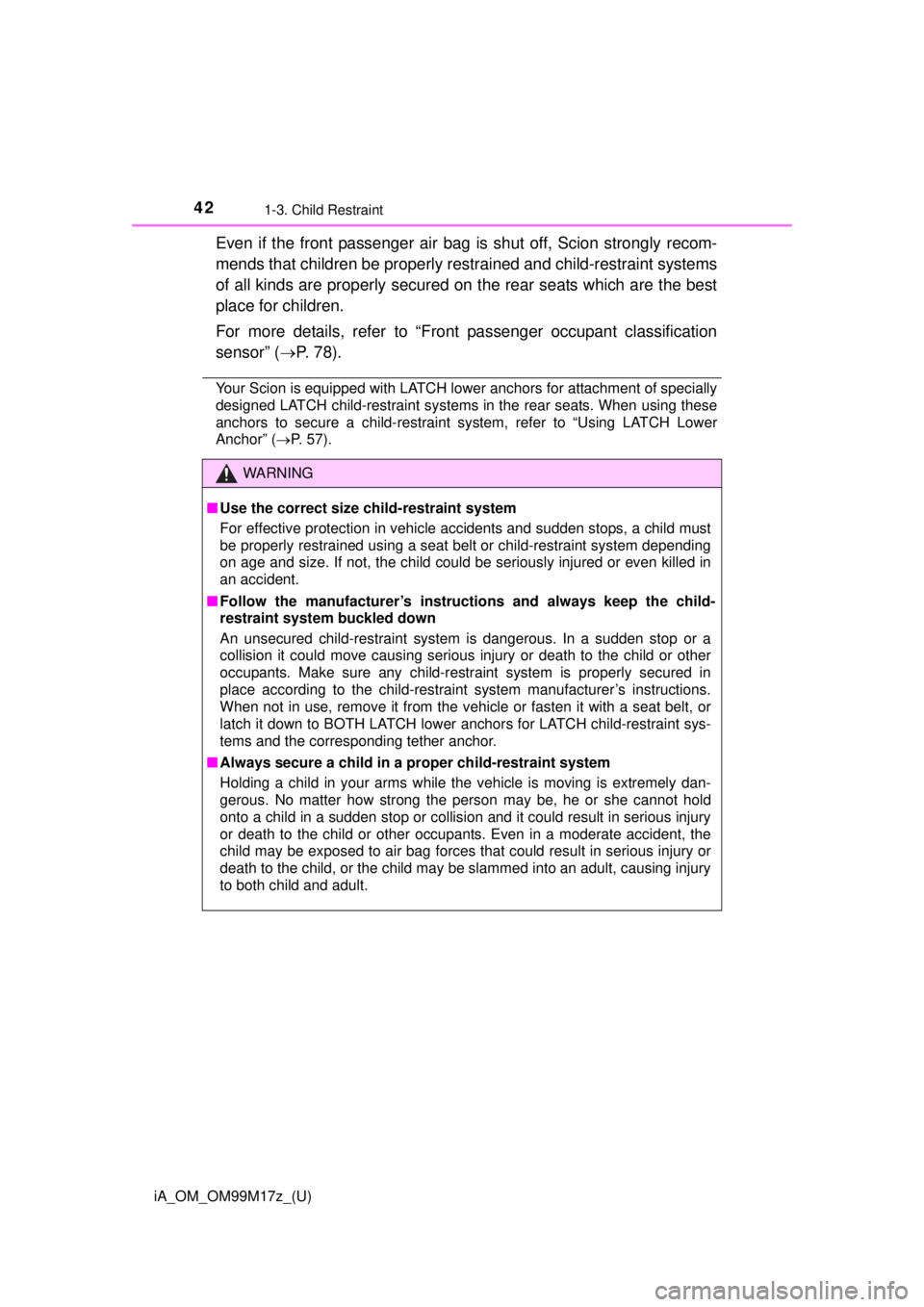
42
iA_OM_OM99M17z_(U)
1-3. Child Restraint
Even if the front passenger air bag is shut off, Scion strongly recom-
mends that children be properly rest rained and child-restraint systems
of all kinds are properly secured on the rear seats which are the best
place for children.
For more details, refer to “Front passenger occupant classification
sensor” ( P. 78).
Your Scion is equipped with LATCH lower anchors for attachment of specially
designed LATCH child-restraint systems in the rear seats. When using these
anchors to secure a child-restraint system, refer to “Using LATCH Lower
Anchor” (P. 57).
WARNING
■Use the correct size child-restraint system
For effective protection in vehicle accidents and sudden stops, a child must
be properly restrained using a seat belt or child-restraint system depending
on age and size. If not, the child could be seriously injured or even killed in
an accident.
■ Follow the manufacturer’s instru ctions and always keep the child-
restraint system buckled down
An unsecured child-restraint system is dangerous. In a sudden stop or a
collision it could move causing serious injury or death to the child or other
occupants. Make sure any child-restraint system is properly secured in
place according to the child-restraint system manufacturer’s instructions.
When not in use, remove it from the vehicle or fasten it with a seat belt, or
latch it down to BOTH LATCH lower anchors for LATCH child-restraint sys-
tems and the corresponding tether anchor.
■ Always secure a child in a proper child-restraint system
Holding a child in your arms while the vehicle is moving is extremely dan-
gerous. No matter how strong the person may be, he or she cannot hold
onto a child in a sudden stop or collision and it could result in serious injury
or death to the child or other occupants. Even in a moderate accident, the
child may be exposed to air bag forces that could result in serious injury or
death to the child, or the child may be slammed into an adult, causing injury
to both child and adult.
Page 43 of 588
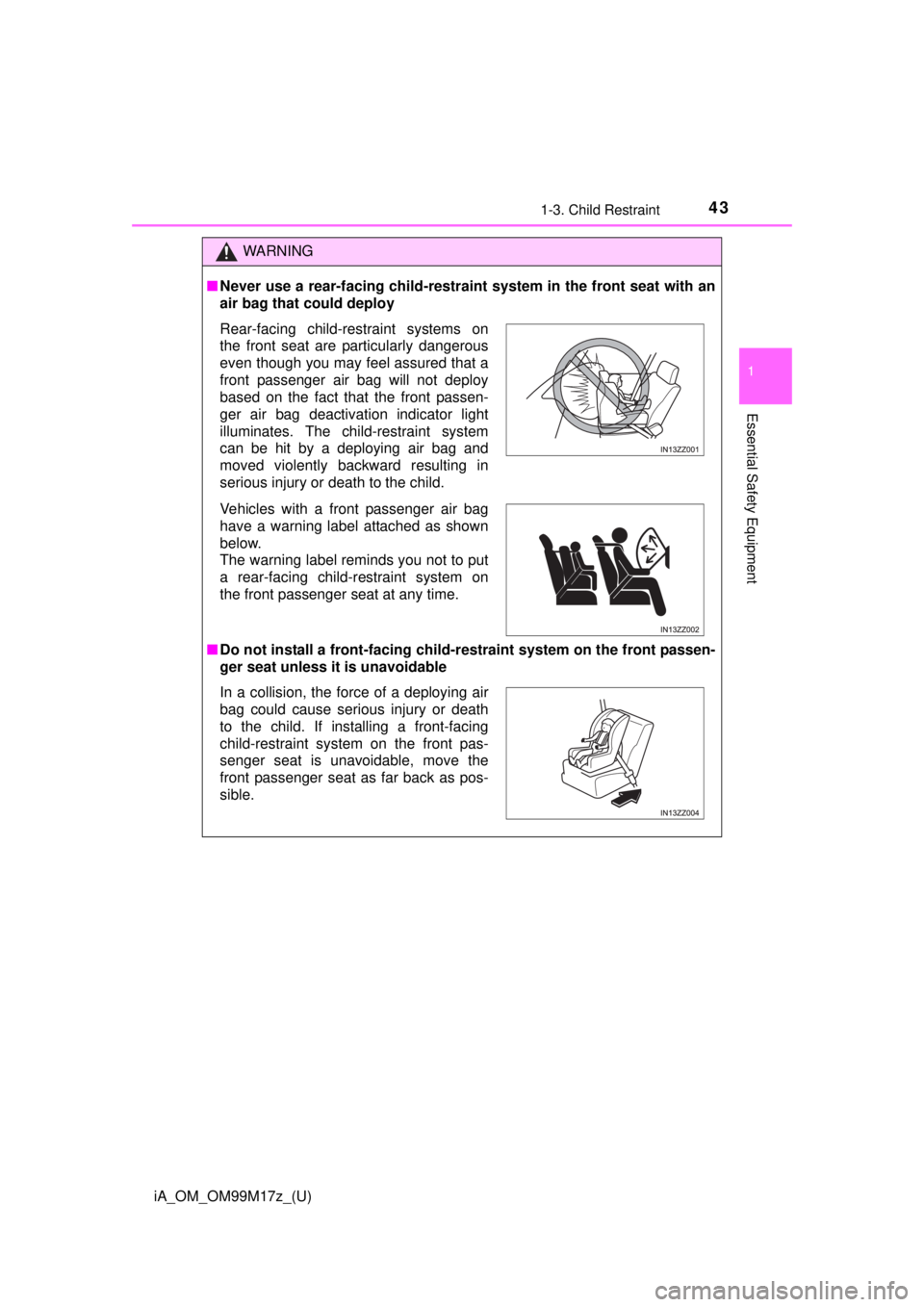
iA_OM_OM99M17z_(U)
431-3. Child Restraint
1
Essential Safety Equipment
WARNING
■Never use a rear-facing child-restra int system in the front seat with an
air bag that could deploy
■ Do not install a front-facing child- restraint system on the front passen-
ger seat unless it is unavoidable
Rear-facing child-restraint systems on
the front seat are particularly dangerous
even though you may feel assured that a
front passenger air bag will not deploy
based on the fact that the front passen-
ger air bag deactivation indicator light
illuminates. The child-restraint system
can be hit by a deploying air bag and
moved violently backward resulting in
serious injury or death to the child.
Vehicles with a front passenger air bag
have a warning label attached as shown
below.
The warning label reminds you not to put
a rear-facing child-restraint system on
the front passenger seat at any time.
In a collision, the force of a deploying air
bag could cause serious injury or death
to the child. If installing a front-facing
child-restraint system on the front pas-
senger seat is unavoidable, move the
front passenger seat as far back as pos-
sible.
Page 44 of 588
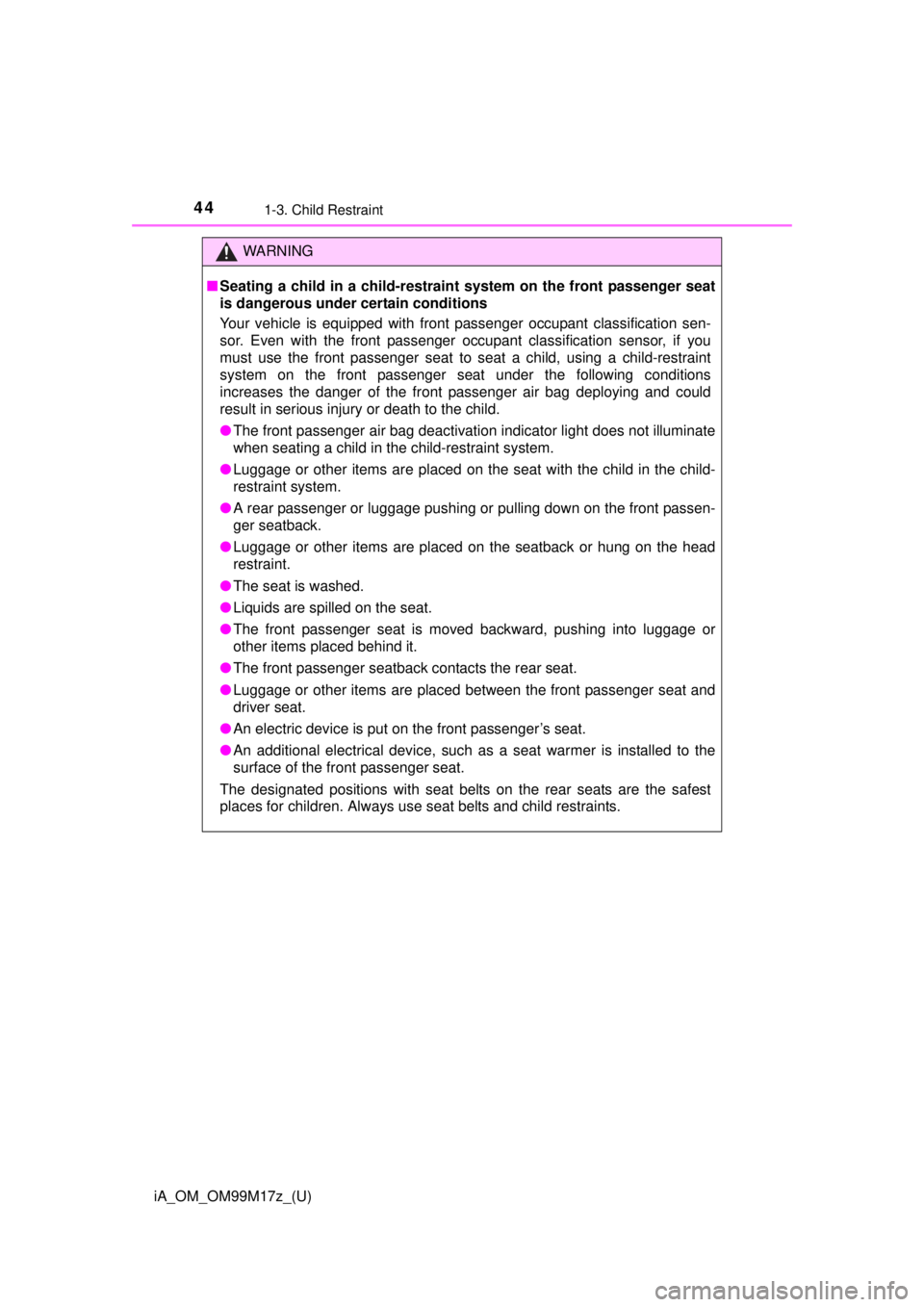
44
iA_OM_OM99M17z_(U)
1-3. Child Restraint
WARNING
■Seating a child in a child-restra int system on the front passenger seat
is dangerous under certain conditions
Your vehicle is equipped with front passenger occupant classification sen-
sor. Even with the front passenger occupant classification sensor, if you
must use the front passenger seat to seat a child, using a child-restraint
system on the front passenger seat under the following conditions
increases the danger of the front passenger air bag deploying and could
result in serious injury or death to the child.
● The front passenger air bag deactivation indicator light does not illuminate
when seating a child in the child-restraint system.
● Luggage or other items are placed on the seat with the child in the child-
restraint system.
● A rear passenger or luggage pushing or pulling down on the front passen-
ger seatback.
● Luggage or other items are placed on the seatback or hung on the head
restraint.
● The seat is washed.
● Liquids are spilled on the seat.
● The front passenger seat is moved backward, pushing into luggage or
other items placed behind it.
● The front passenger seatback contacts the rear seat.
● Luggage or other items are placed between the front passenger seat and
driver seat.
● An electric device is put on the front passenger’s seat.
● An additional electrical device, such as a seat warmer is installed to the
surface of the front passenger seat.
The designated positions with seat belts on the rear seats are the safest
places for children. Always use seat belts and child restraints.
Page 45 of 588
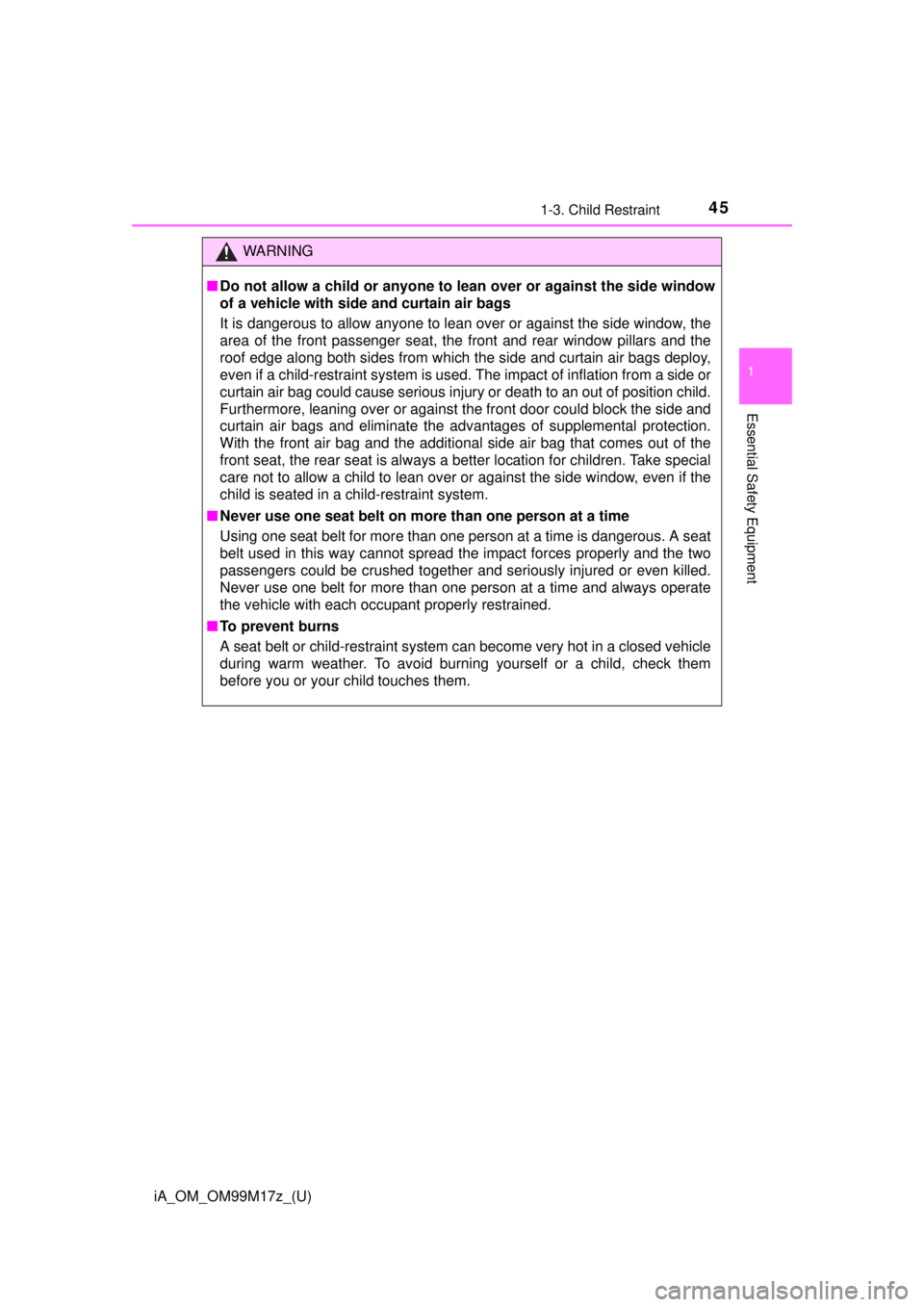
iA_OM_OM99M17z_(U)
451-3. Child Restraint
1
Essential Safety Equipment
WARNING
■Do not allow a child or anyone to lean over or against the side window
of a vehicle with side and curtain air bags
It is dangerous to allow anyone to lean over or against the side window, the
area of the front passenger seat, the front and rear window pillars and the
roof edge along both sides from which the side and curtain air bags deploy,
even if a child-restraint system is used. The impact of inflation from a side or
curtain air bag could cause serious injury or death to an out of position ch\
ild.
Furthermore, leaning over or against t he front door could block the side and
curtain air bags and eliminate the adv antages of supplemental protection.
With the front air bag and the additional side air bag that comes out of the
front seat, the rear seat is always a better location for children. Take special
care not to allow a child to lean over or against the side window, even if the
child is seated in a child-restraint system.
■ Never use one seat belt on more than one person at a time
Using one seat belt for more than one person at a time is dangerous. A seat
belt used in this way cannot spread the impact forces properly and the two
passengers could be crushed together and seriously injured or even killed.
Never use one belt for more than one person at a time and always operate
the vehicle with each occupant properly restrained.
■ To prevent burns
A seat belt or child-restraint system can become very hot in a closed vehicle
during warm weather. To avoid burning yourself or a child, check them
before you or your child touches them.
Page 46 of 588
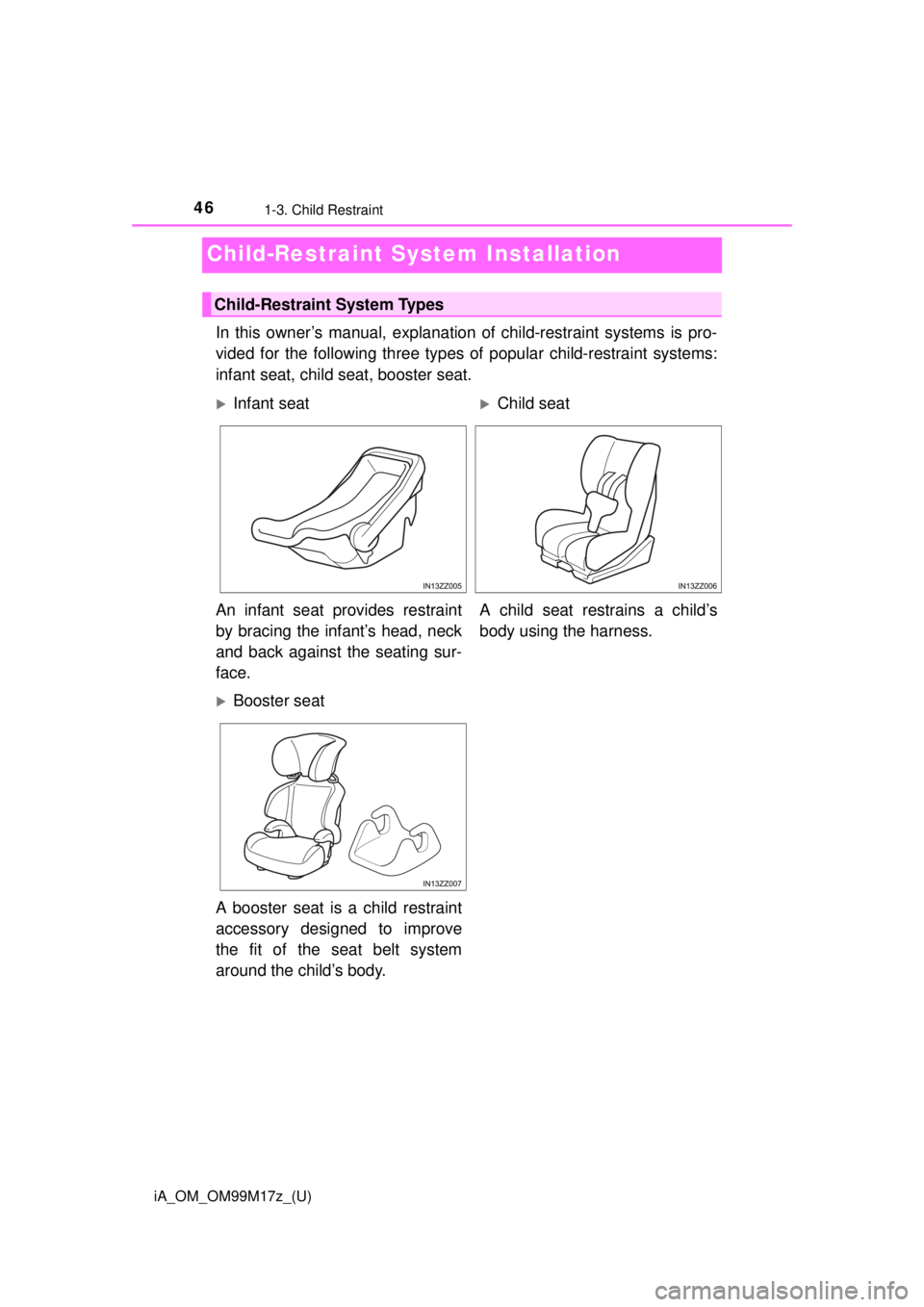
46
iA_OM_OM99M17z_(U)
1-3. Child Restraint
Child-Restraint System Installation
In this owner’s manual, explanation of child-restraint systems is pro-
vided for the following three types of popular child-restraint systems:
infant seat, child seat, booster seat.
Child-Restraint System Types
Infant seatChild seat
An infant seat provides restraint
by bracing the infant’s head, neck
and back against the seating sur-
face. A child seat restrains a child’s
body using the harness.
Booster seat
A booster seat is a child restraint
accessory designed to improve
the fit of the seat belt system
around the child’s body.
Page 47 of 588
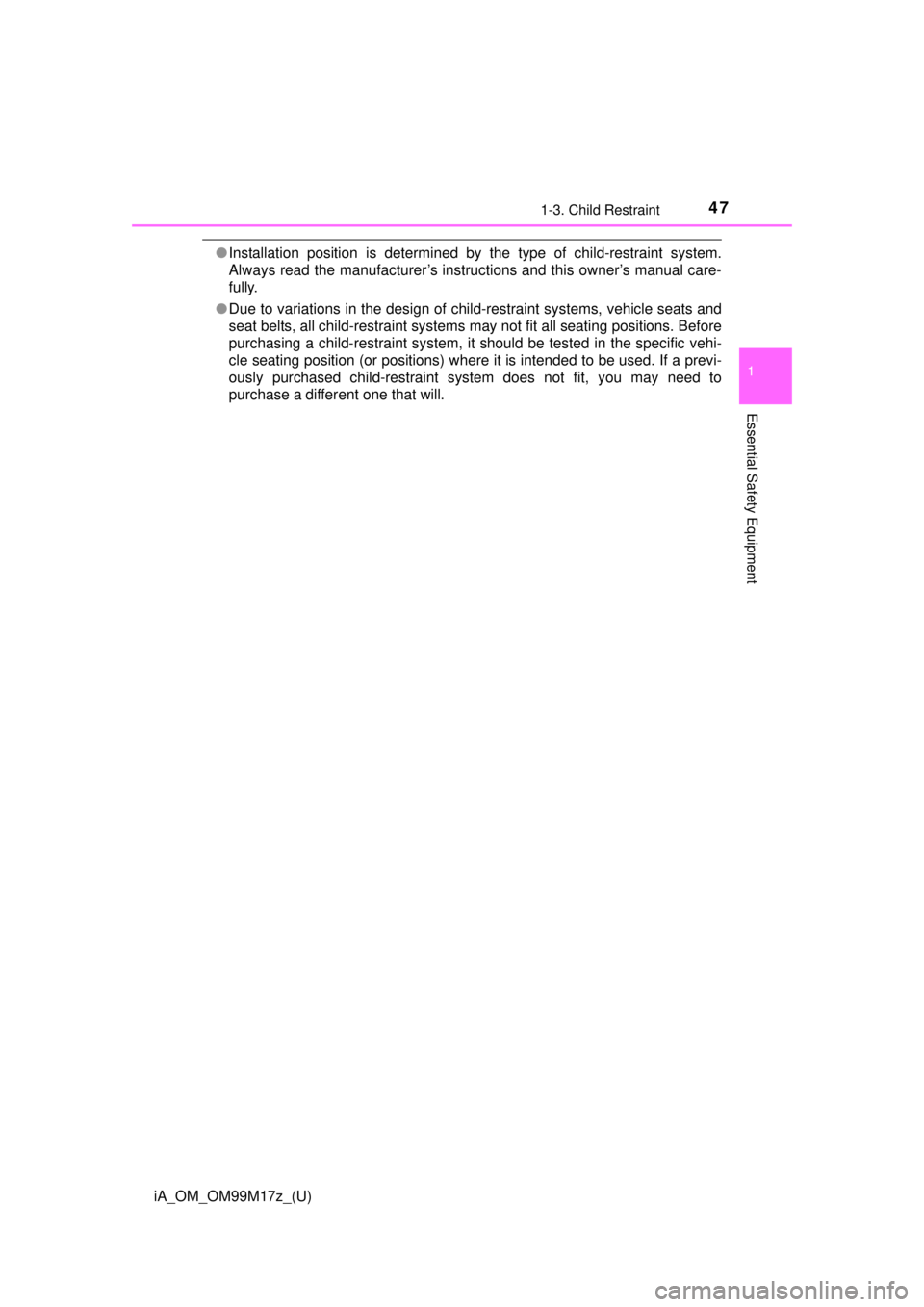
iA_OM_OM99M17z_(U)
471-3. Child Restraint
1
Essential Safety Equipment
●Installation position is determined by the type of child-restraint system.
Always read the manufacturer’s instructions and this owner’s manual care-
fully.
● Due to variations in the design of child-restraint systems, vehicle seats and
seat belts, all child-restraint systems may not fit all seating positions. Before
purchasing a child-restraint system, it should be tested in the specific vehi-
cle seating position (or positions) where it is intended to be used. If a previ-
ously purchased child-restraint system does not fit, you may need to
purchase a different one that will.
Page 48 of 588
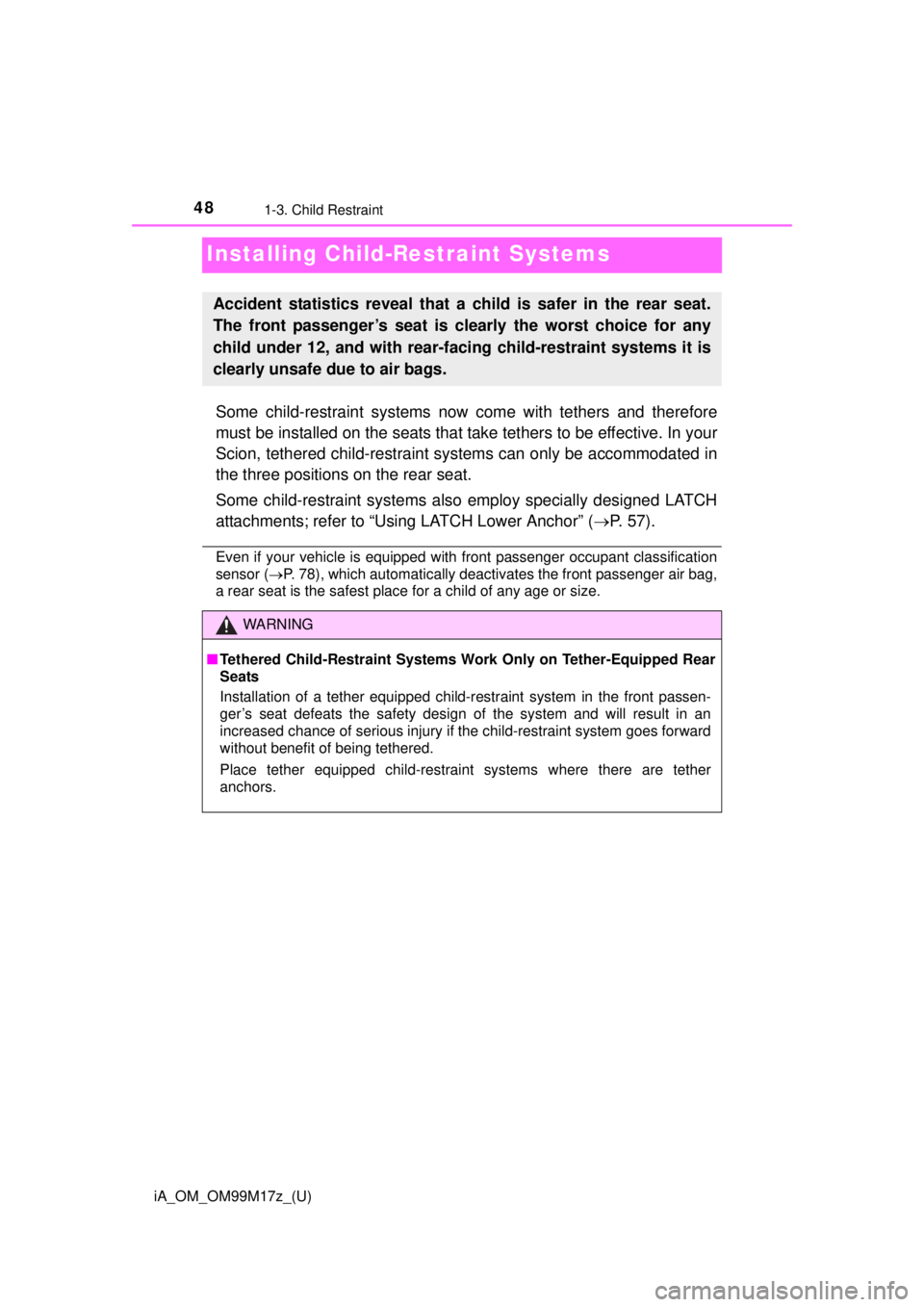
48
iA_OM_OM99M17z_(U)
1-3. Child Restraint
Installing Child-Restraint Systems
Some child-restraint systems now come with tethers and therefore
must be installed on the seats that ta ke tethers to be effective. In your
Scion, tethered child-restraint sy stems can only be accommodated in
the three positions on the rear seat.
Some child-restraint systems also employ specially designed LATCH
attachments; refer to “Using LATCH Lower Anchor” ( P. 57).
Even if your vehicle is equipped with front passenger occupant classification
sensor ( P. 78), which automatically deactivates the front passenger air bag,
a rear seat is the safest place for a child of any age or size.
Accident statistics reveal that a child is safer in the rear seat.
The front passenger’s seat is clearly the worst choice for any
child under 12, and with rear-faci ng child-restraint systems it is
clearly unsafe due to air bags.
WARNING
■ Tethered Child-Restraint Systems Work Only on Tether-Equipped Rear
Seats
Installation of a tether equipped child-restraint system in the front passen-
ger’s seat defeats the safety design of the system and will result in an
increased chance of serious injury if the child-restraint system goes forward
without benefit of being tethered.
Place tether equipped child-restraint systems where there are tether
anchors.
Page 49 of 588
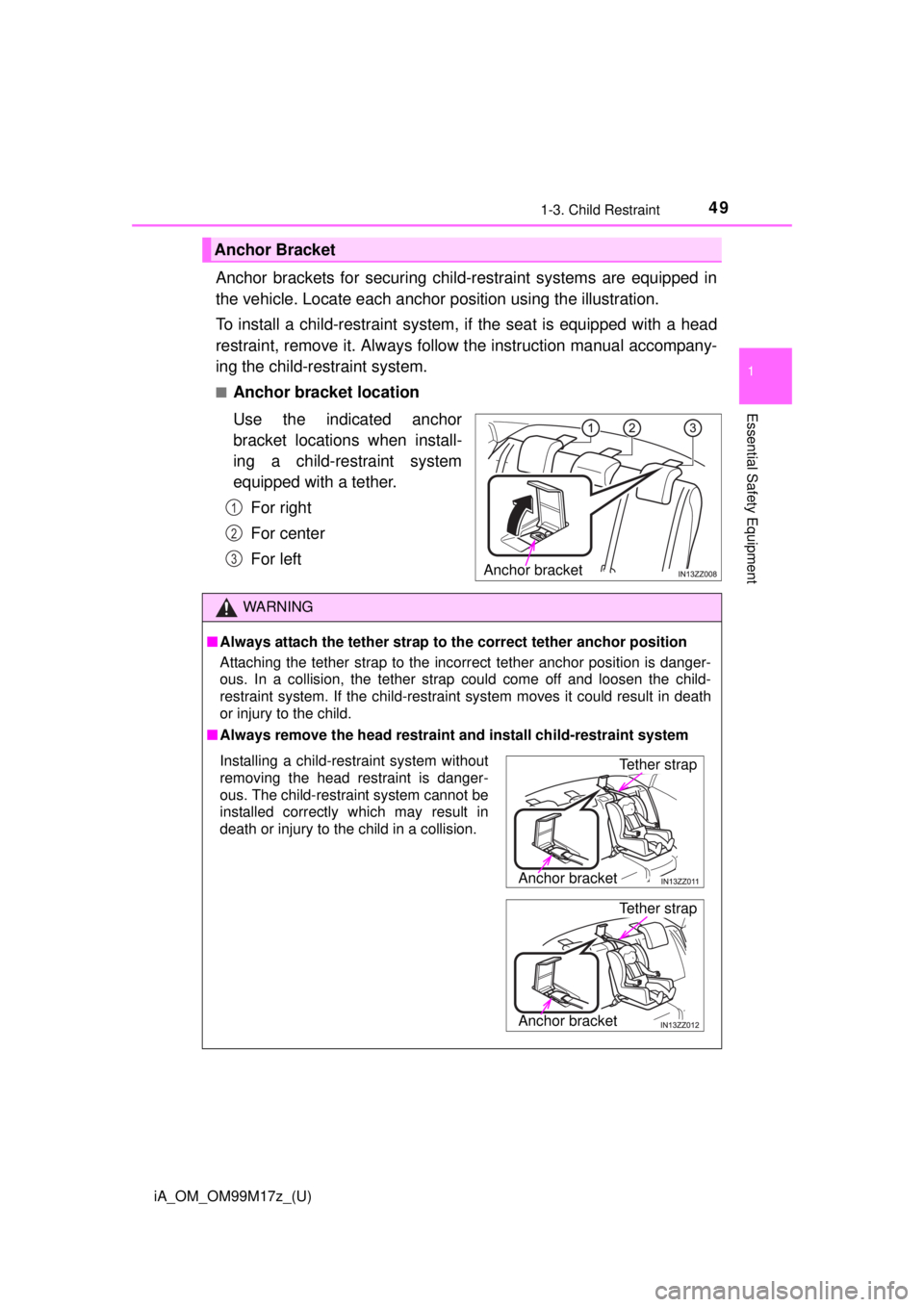
iA_OM_OM99M17z_(U)
491-3. Child Restraint
1
Essential Safety Equipment
Anchor brackets for securing child-restraint systems are equipped in
the vehicle. Locate each anchor position using the illustration.
To install a child-restraint system, if the seat is equipped with a head
restraint, remove it. Always follo w the instruction manual accompany-
ing the child-restraint system.
■Anchor bracket location
Use the indicated anchor
bracket locations when install-
ing a child-restraint system
equipped with a tether.
For right
For center
For left
Anchor Bracket
Anchor bracket
1
2
3
WARNING
■Always attach the tether strap to the correct tether anchor position
Attaching the tether strap to the incorrect tether anchor position is danger-
ous. In a collision, the tether strap could come off and loosen the child-
restraint system. If the child-restraint system moves it could result in death
or injury to the child.
■ Always remove the head restraint and install child-restraint system
Installing a child-restraint system without
removing the head restraint is danger-
ous. The child-restraint system cannot be
installed correctly which may result in
death or injury to the child in a collision.Tether strap
Anchor bracket
Anchor bracket
Tether strap
Page 50 of 588
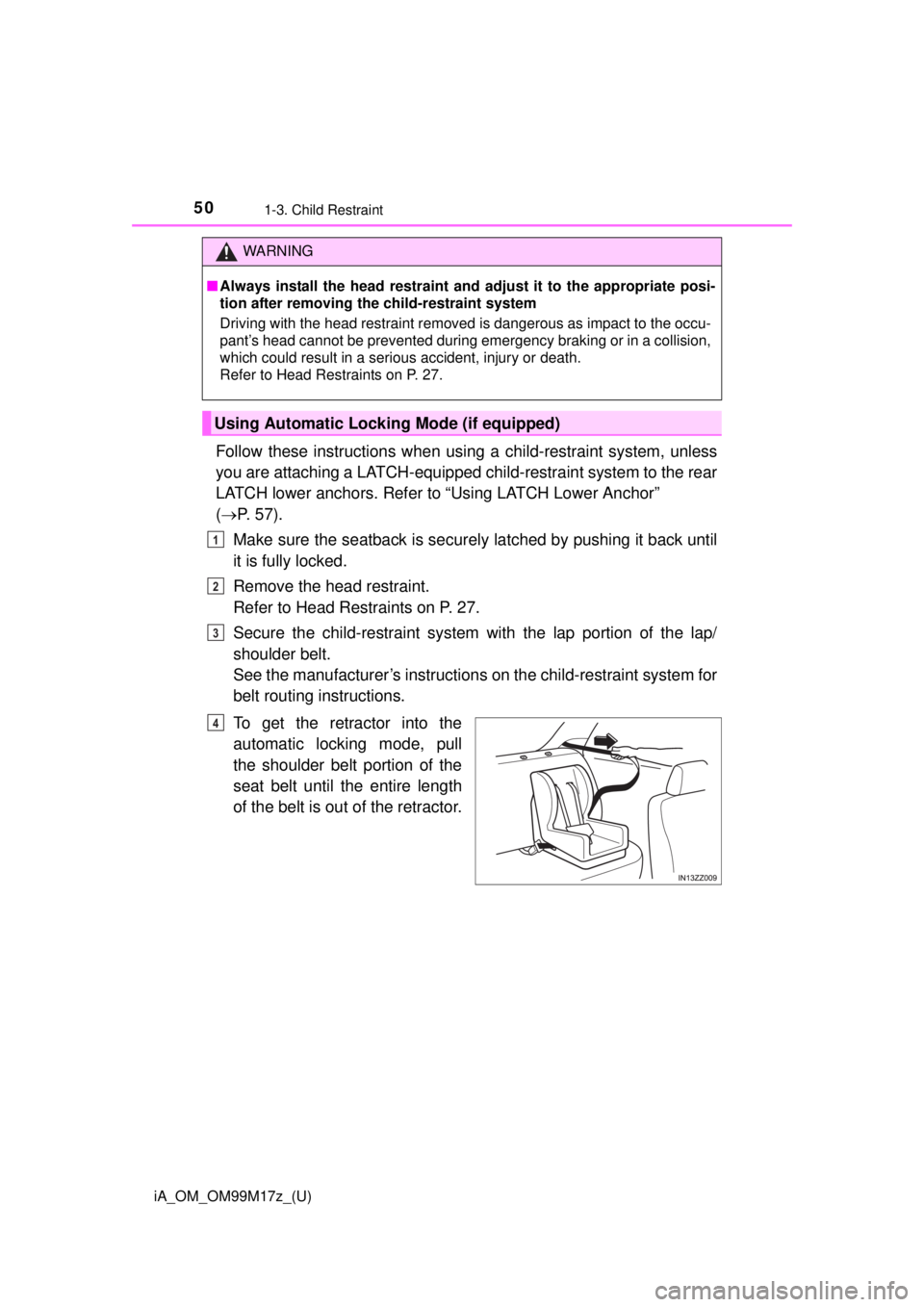
50
iA_OM_OM99M17z_(U)
1-3. Child Restraint
Follow these instructions when using a child-restraint system, unless
you are attaching a LATCH-equipped ch ild-restraint system to the rear
LATCH lower anchors. Refer to “Using LATCH Lower Anchor”
( P. 57).
Make sure the seatback is securely latched by pushing it back until
it is fully locked.
Remove the head restraint.
Refer to Head Restraints on P. 27.
Secure the child-restraint system with the lap portion of the lap/
shoulder belt.
See the manufacturer’s instructions on the child-restraint system for
belt routing instructions.
To get the retractor into the
automatic locking mode, pull
the shoulder belt portion of the
seat belt until the entire length
of the belt is ou t of the retractor.
WARNING
■Always install the head restraint and adjust it to the appropriate posi-
tion after removing the child-restraint system
Driving with the head restraint removed is dangerous as impact to the occu-
pant’s head cannot be prevented during emergency braking or in a collision,
which could result in a serious accident, injury or death.
Refer to Head Restraints on P. 27.
Using Automatic Locking Mode (if equipped)
1
2
3
4